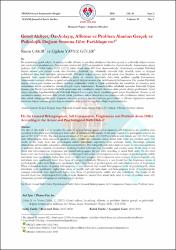Genel Aidiyet, Öz-Anlayış, Affetme ve Problem Alanları Gerçek ve Psikolojik Doğum Sırasına Göre Farklılaşır mı?
Citation
ÇAKIR, Sinem & Çiğdem Yavuz GÜLER. "Genel Aidiyet, Öz-Anlayış, Affetme ve Problem Alanları Gerçek ve Psikolojik Doğum Sırasına Göre Farklılaşır mı?". MANAS Sosyal Araştırmalar Dergisi, 10.2 (2021): 1332-1352.Abstract
Bu araştırmada, genel aidiyet, öz-anlayış, kendini affetme ve problem alanlarının bireylerin gerçek ve psikolojik doğum sırasına göre incelenmesi amaçlanmıştır. Araştırmanın örneklemini 18-73 yaş arasında ki katılımcılar oluşturmaktadır. Araştırmanın çalışma grubunu; 261’i (%64.8) kadın, 142’si (%35.2) erkek olmak üzere 403 birey oluşturmaktadır. Araştırmanın sonuçları Psikolojik doğum sırasına göre ortanca çocuk olan bireylerin, akademik, aile, arkadaşlık, romantik ilişki, cinsellik, uyum ve duygusal problemleri daha fazla yaşadığını göstermektedir. Psikolojik doğum sırasına göre tek çocuk olan bireylerin ise akademik, aile, romantik ilişki, sigara/alkol/madde kullanımı, kişilik ve cinsellik alanlarında daha fazla problem yaşadığı bulunmuştur. Araştırmada; özanlayış, affetme ve genel aidiyetin gerçek doğum sırasına göre farklılaşmadığı bulunmuştur. Öte yandan Psikolojik doğum sırasına göre ortanca çocukların özanlayış ortalamaları büyük ve küçük çocuklardan; tek çocukların ise özanlayış puan otrtalamaları küçük çocuklardan anlamlı düzeyde düşük bulunmuştur. Bununla birlikte affedicilik açısından Psikolojik Doğum Sırasına göre Büyük Çocukların affedicilik puanlarının tek çocuklardan anlamlı derecede daha yüksek olduğu görülmüştür. Genel aidiyet açısından değerlendirildiğinde; Psikolojik Doğum Sırasına göre büyük çocukların genel aidiyet düzeylerinin, Ortanca ve tek çocuklardan anlamlı derecede daha yüksek küçük çocukların aidiyet düzeylerinin ise ortanca ve tek çocuklardan anlamlı derecede daha yüksek olduğu görülmüştür. Araştırma sonuçları; problem alanları, özanlayış, genel aidiyet ve affetme değişkenleri açısından psikolojik doğum sırasının, gerçek doğum sırasından daha ayırıcı bir değişken olduğunu göstermektedir. The aim of this study was to examine the areas of general belongingness, self-compassion, self-forgiveness and problem areas according to the actual and psychological birth order of individuals. The sample of the study consisted of participants between the ages of 18-73 (X²=35.20). The study group consisted of 403 individuals, 261 (64.8%) of whom were female and 142 (35.2%) were male. Demographic form contained questions about gender, age, education status, actual birth order and problem areas. The results of the study show that psychological middle individuals, experience more academic, family, friendship, romantic relationships and sexuality, adaptation and emotional problems. Psychologically only individuals are found to have more problems in academic, family, romantic relationships, smoking/alcohol/substance use, personality and sexuality areas. In the study, it was found that self-compassion, forgiveness and general belongingness did not differ according to actual birth order. On the other hand, it was also found that according to their psychological birth order, self-compassion score averages of psychologically middle individuals were significantly higher than those of oldest and youngest. Self-compassion score averages of psychologically only individuals were significantly lower than those of youngest individuals. Moreover, it was found that the forgiveness scores of psychologically oldest individuals were significantly higher than those of psychologically only individuals in terms of forgiveness. When evaluated in terms of general belongingness, it was observed that overall belongingness levels of psychologically oldest individuals were significantly higher than those of middle and only individuals, and belongingness levels of psychologically youngest individuals were significantly higher than those of psychologically middle and only individuals. The results of the research show that psychological birth order is more distinctive variable than actual birth order in terms of problem areas, self-compassion, general belongingness and forgiveness variables.



















